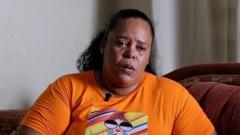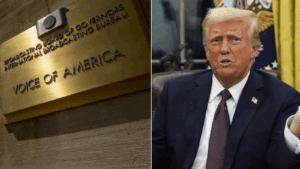The heartbreaking story highlights the fears and frustrations of families caught in a web of deportation policies and alleged gang affiliations.
Mother of Deported Son Recognizes Him in Mega-Prison Footage in El Salvador

Mother of Deported Son Recognizes Him in Mega-Prison Footage in El Salvador
A Venezuelan mother, Myrelis Casique López, identifies her son in shocking footage of deported migrants.
In the impoverished neighborhood of Maracay, Venezuela, Myrelis Casique López eagerly awaited her son, Francisco José García Casique, on Saturday. After migrating to the United States 18 months prior, he was to be deported back to Caracas due to his illegal status. They spoke moments before his supposed departure; she felt a flicker of hope.
However, her joy quickly turned to disbelief when she spotted him— not in Venezuela, but in El Salvador. The footage televised showed 238 Venezuelans, sent by U.S. authorities, arriving at the ominous Terrorism Confinement Centre (Cecot). López recognized her son by his visible arm tattoo and distinctive features. "It's him. It's him," she proclaimed, despite an official list of the deportees not yet being released.
The López family maintains that García is innocent, asserting that he is not associated with the Tren de Aragua gang, which the Trump administration has labeled a terrorist organization. This powerful criminal group is implicated in serious crimes, such as drug trafficking and murder. Immigration officials claim that deportees were thoroughly vetted and confirmed to be gang members. However, many of these individuals previously lacked criminal records.
García's immigration journey began in 2019 as he fled Venezuela's dire circumstances. His mother, who has not seen him in six years, emphasized his peaceful life as a barber and expressed sorrow that his tattoos may have led to erroneous identification as a gang member. Similar claims have arisen from other families, raising concerns about mistaken identities due to tattoos.
The implications of the U.S. government's enforcement were highlighted when President Trump invoked the 1798 Alien Enemies Act, enabling swift deportations without due process. This development has instilled fear within the Venezuelan community in the U.S., especially concerning those who may be unjustly accused and deported.
Adelys Ferro, an advocate for Venezuelan-Americans, articulated the growing anxiety, stating, “We want justice, but we don’t understand the criteria used.” This sentiment resonated with immigration lawyer Brian de la Vega, who voiced concerns over the fuzzy guidelines for identifying gang members, underscoring worries about broader repercussions for innocent families.
The continued deportation actions, coinciding with the termination of Temporary Protected Status (TPS) for nearly 350,000 Venezuelans living in the U.S., has left many feeling vulnerable and uncertain. Daniel Campo, a Venezuelan supporter of Trump, expressed support but also apprehension about the realities of deportation policies targeting alleged gang members.
Among those anxious about their status is Yilber, a 25-year-old Venezuelan man who entered the U.S. in 2022 after a treacherous journey. "I left Venezuela because of the repression, and the insecurity. My neighborhood had gangs. Now, I don't know what's going to happen here," he shared, reflecting a pervasive sense of despair among many in the Venezuelan diaspora.
As stories like Garcia’s emerge, they serve as poignant reminders of the human toll that often accompanies the enforcement of stringent immigration laws and policies, leaving families in turmoil and uncertainty about their loved ones’ fates.
However, her joy quickly turned to disbelief when she spotted him— not in Venezuela, but in El Salvador. The footage televised showed 238 Venezuelans, sent by U.S. authorities, arriving at the ominous Terrorism Confinement Centre (Cecot). López recognized her son by his visible arm tattoo and distinctive features. "It's him. It's him," she proclaimed, despite an official list of the deportees not yet being released.
The López family maintains that García is innocent, asserting that he is not associated with the Tren de Aragua gang, which the Trump administration has labeled a terrorist organization. This powerful criminal group is implicated in serious crimes, such as drug trafficking and murder. Immigration officials claim that deportees were thoroughly vetted and confirmed to be gang members. However, many of these individuals previously lacked criminal records.
García's immigration journey began in 2019 as he fled Venezuela's dire circumstances. His mother, who has not seen him in six years, emphasized his peaceful life as a barber and expressed sorrow that his tattoos may have led to erroneous identification as a gang member. Similar claims have arisen from other families, raising concerns about mistaken identities due to tattoos.
The implications of the U.S. government's enforcement were highlighted when President Trump invoked the 1798 Alien Enemies Act, enabling swift deportations without due process. This development has instilled fear within the Venezuelan community in the U.S., especially concerning those who may be unjustly accused and deported.
Adelys Ferro, an advocate for Venezuelan-Americans, articulated the growing anxiety, stating, “We want justice, but we don’t understand the criteria used.” This sentiment resonated with immigration lawyer Brian de la Vega, who voiced concerns over the fuzzy guidelines for identifying gang members, underscoring worries about broader repercussions for innocent families.
The continued deportation actions, coinciding with the termination of Temporary Protected Status (TPS) for nearly 350,000 Venezuelans living in the U.S., has left many feeling vulnerable and uncertain. Daniel Campo, a Venezuelan supporter of Trump, expressed support but also apprehension about the realities of deportation policies targeting alleged gang members.
Among those anxious about their status is Yilber, a 25-year-old Venezuelan man who entered the U.S. in 2022 after a treacherous journey. "I left Venezuela because of the repression, and the insecurity. My neighborhood had gangs. Now, I don't know what's going to happen here," he shared, reflecting a pervasive sense of despair among many in the Venezuelan diaspora.
As stories like Garcia’s emerge, they serve as poignant reminders of the human toll that often accompanies the enforcement of stringent immigration laws and policies, leaving families in turmoil and uncertainty about their loved ones’ fates.























